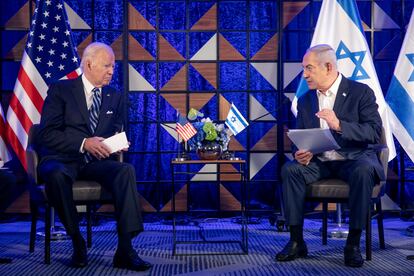All wars escalate
When weapons corner politics, only the spiral of violence governs. We see it between Ukraine and Russia, between Hamas and Israel, and this Wednesday in the attack that killed over a hundred people in Iran

Escalation is in the nature of war. When weapons corner politics, only the spiral of violence governs. We see it these days between Ukraine and Russia. It is part of the logic of warfare that Kyiv responds to attacks on its citizens in its territory with attacks on Russian territory in which innocent Russian civilians are also killed. And that Russia strikes back, in turn increasing shelling.
This is also how it works between Hamas and Israel. Perhaps even more virulently. If in Russia the war fuels the nuclear threat, the Gaza war spills over at full speed to the Lebanese border with Hezbollah’s missiles and drones; in the West Bank with the provocations of extremist Israeli settlers; in Lebanon with the targeted assassination of Hamas’ number two, Saleh al-Arouri; and on the coasts of Yemen with the Houthi’s attacks on maritime traffic. And this Wednesday in Iran, with the double bombing that killed more than 100 people in the Iranian cemetery of Kerman, where they were commemorating the anniversary of the targeted assassination of Qasem Soleimani, the supreme commander of the guardians of the revolution.
Washington is focused on a strategic objective for both wars: to prevent them from spilling over, threatening world peace and even trapping its troops in the hornet’s nest, once again, like so many others in the last century. All major wars began as local feuds that then escalated and spread.
To achieve this, the United States does one thing and the opposite. It carefully graduates military aid to Ukraine and gives unlimited aid to Israel. It is thus seeking an impossible and difficult to explain balance that will allow its allies to make moderate progress without unleashing an open international war.
Discrepancies over the future are huge for Israel and Palestine, where Washington’s responsibilities lie. Joe Biden warmly embraces Netanyahu, but he is fed up with his extremist government and his bad annexationist ideas about Gaza and the West Bank. With so much military aid and such blatant diplomatic support, the U.S. president wants to lead Israel to the only solution that preserves democracy and the Jewish character of the state, namely the recognition of the Palestinian state, precisely what his Israeli ally and protégé has wanted to destroy once and for all. In Israel’s victory, Biden seeks Netanyahu’s defeat.
At the moment, the response he is getting is disturbing: the war is not letting up in Gaza and has all the signs that it is spilling out of control on all sides.
It would be in Washington’s interest for regional actors to organize the way out of war and toward peace. The future of Ukraine is quite clear: within the Atlantic and European framework. The responsibilities of Brussels in the war in Ukraine, finally a candidate for EU membership, will increase in the future. And decrease, on the other hand, when it comes to the Gaza war. Not only because of the divergent positions of the Europeans — who could not agree on voting for a ceasefire — but also because of the doubts about the future of NATO with a Trump White House.
Hence the difficulty Washington faced in finding allies for its naval operation off the coast of Yemen without the support of NATO or the EU.
Sign up for our weekly newsletter to get more English-language news coverage from EL PAÍS USA Edition
Tu suscripción se está usando en otro dispositivo
¿Quieres añadir otro usuario a tu suscripción?
Si continúas leyendo en este dispositivo, no se podrá leer en el otro.
FlechaTu suscripción se está usando en otro dispositivo y solo puedes acceder a EL PAÍS desde un dispositivo a la vez.
Si quieres compartir tu cuenta, cambia tu suscripción a la modalidad Premium, así podrás añadir otro usuario. Cada uno accederá con su propia cuenta de email, lo que os permitirá personalizar vuestra experiencia en EL PAÍS.
¿Tienes una suscripción de empresa? Accede aquí para contratar más cuentas.
En el caso de no saber quién está usando tu cuenta, te recomendamos cambiar tu contraseña aquí.
Si decides continuar compartiendo tu cuenta, este mensaje se mostrará en tu dispositivo y en el de la otra persona que está usando tu cuenta de forma indefinida, afectando a tu experiencia de lectura. Puedes consultar aquí los términos y condiciones de la suscripción digital.









































